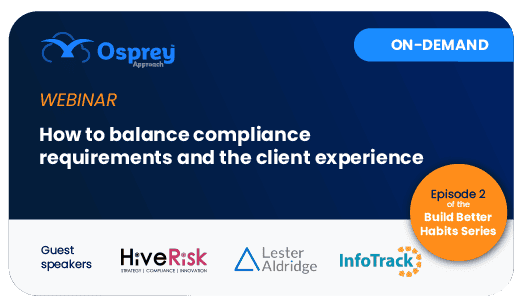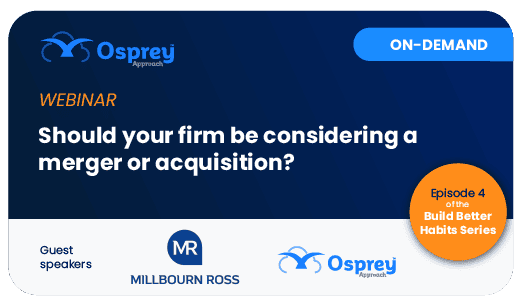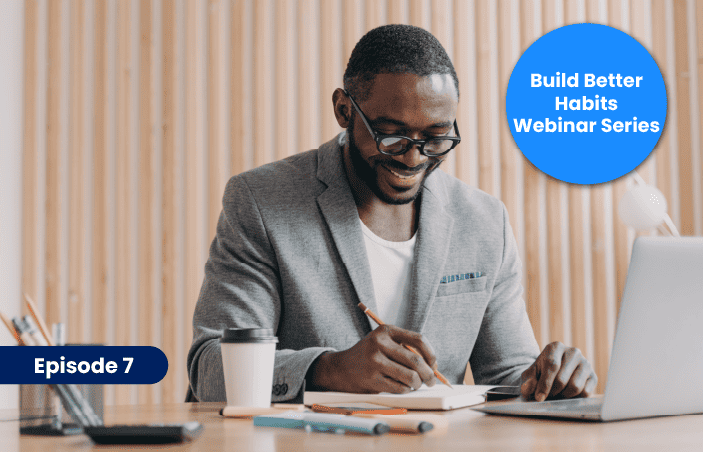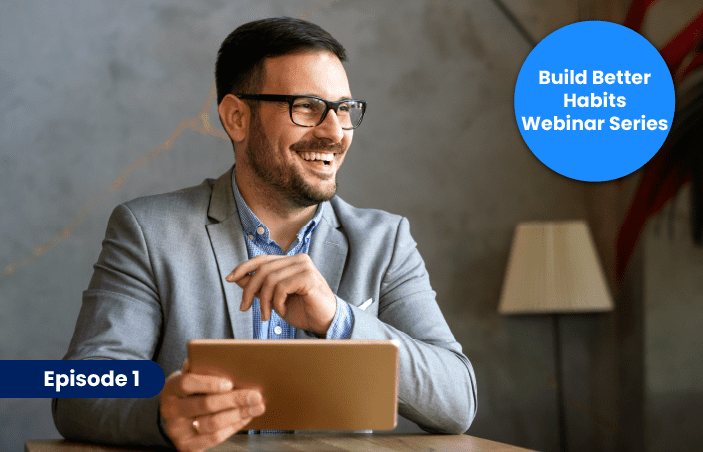Contents
Think digital-first: Insights from industry experts
In the penultimate episode of series three of the Build Better Habits webinar series, we explored the mindset of thinking digital-first and shared best practices for future-proofing your law firm to stay competitive and successful long term.
Our expert panel included Sarah Charlton, CEO of a Eaton-Evans & Morris Solicitors; Kirsty Pappin, founder of Aries Legal Practice Management; and Sarah Keegan, co-founder of The CS Partnership. They discussed how to stay competitive, who is responsible for digital initiatives, and what the future firm will look like.
This episode covered:
- Strategies to stay competitive
- Who should be responsible for digital initiatives
- Key habits for thinking digital-first
- Success measure to track effectiveness
- Future trends and challenges in law firm operations
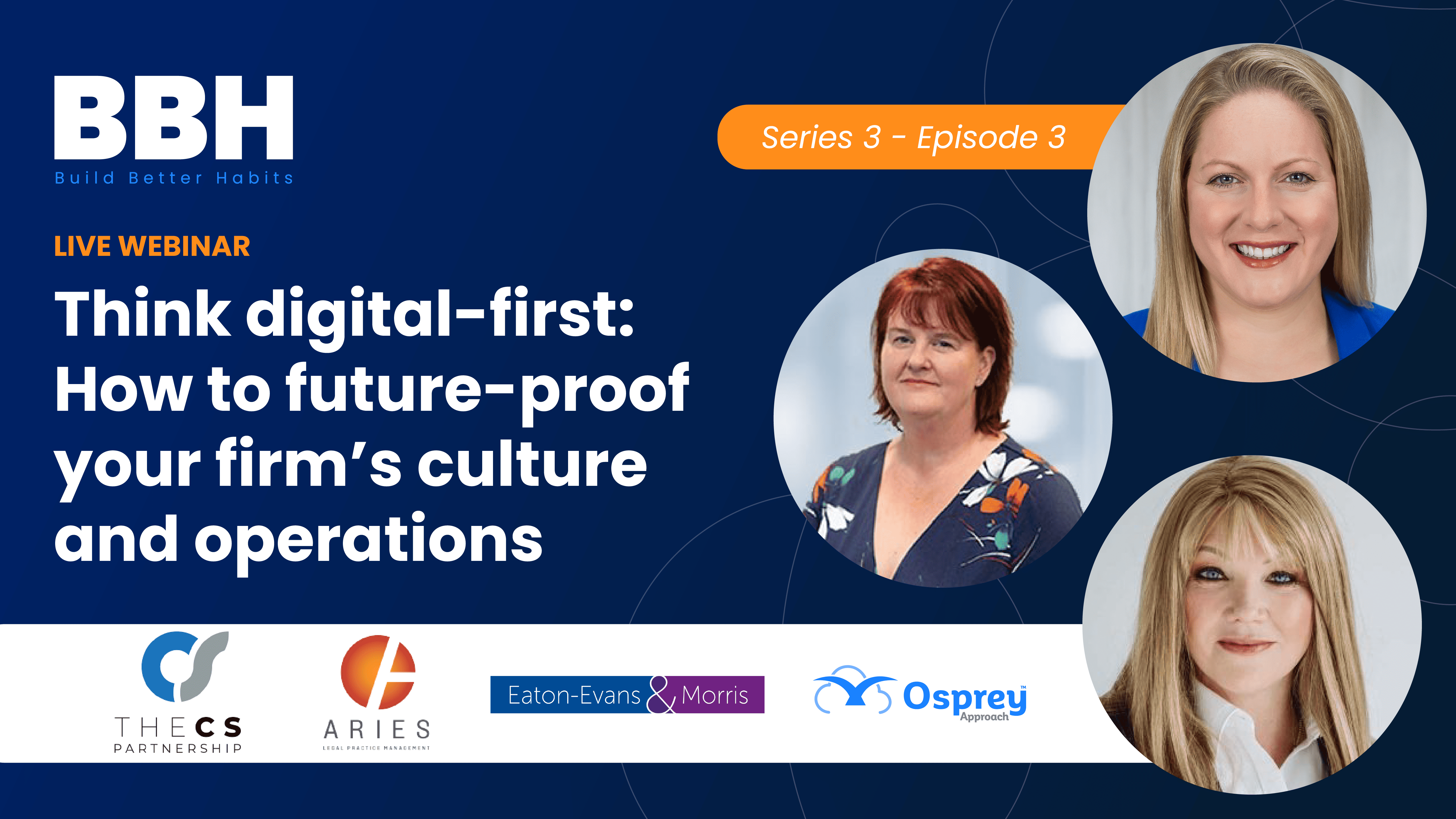
Staying competitive in a crowded market
In a saturated market, law firms must find ways to stand out and attract clients. The panellists shared their insights on how to stay competitive by leveraging technology and understanding client needs.
Kirsty stressed the importance of identifying your unique selling point (USP). “What is it that makes you different to all of those [other firms]? Start thinking about that and then start delving in,” she advised. She suggested using technology to streamline processes and improve client experiences to stand out.
Sarah C added that understanding your target area and client needs is crucial. She shared her experience of creating small focus groups within her firm to gather diverse perspectives and identify what influences client decisions. “You have to find a USP. It may be a case that you need to bring other people in to understand what their decision process is and then capitalise on that,” she explained.
Sarah K emphasised the importance of client service. “People buy people, really. And it is important to have a USP, but maybe it could be something like we look after you,” she said. She highlighted that building strong relationships with clients can help firms stay competitive even in a fast-paced, tech-driven environment.
Who should be responsible for digital initiatives?
Implementing digital initiatives requires clear leadership and collaboration across the firm. The panellists discussed who should take the lead and how to ensure successful digital transformation.
Sarah K suggested that the owners or directors should lead the charge but recognised that they might not always be the best suited for the task. “Whoever wants to do this, and who is capable of being heard in the firm is the person best placed for that job,” she said.
Sarah C shared that in her firm, everyone is encouraged to contribute ideas for digital initiatives. “When we recruit, we are looking for people who are forward-thinking and tech-orientated. That’s who we recruit,” she explained. She emphasised the importance of a culture where everyone’s opinions are valued.
Kirsty noted that in many SME law firms, the practice manager or operations director often takes on the role of managing digital initiatives. “It’s normally that operational level in the SME that’s going out and doing it,” she said. She highlighted the importance of project management skills in successfully implementing digital changes.
Six key habits for thinking digital-first
Adopting a digital-first mindset involves developing key habits that promote continuous improvement, effective communication, and staying informed about technological advancements. The panellists shared their top habits for ensuring a digital-first mindset within law firms:
- Continuous improvement: Kirsty emphasised the importance of questioning everything and continuously seeking ways to improve. “Never settling for it being okay. We’ve done it now, and that’s it. And we’re going to stay like this for 5 years,” she said.
- Effective communication: Sarah K stressed the need for regular communication within the firm. “Make that a habit in as much as we meet every Friday on Teams,” she suggested. She highlighted the importance of open and honest discussions about what is and isn’t working.
- Hybrid working: Sarah C noted that hybrid working can drive digital adoption. “It suddenly becomes in that individual’s interest to move digital, because if they don’t move digital, they can’t home-work,” she explained.
- Regular process reviews: Kirsty recommended regularly reviewing processes and seeking feedback from staff. “Sometimes you get some of the best feedback in that very casual conversation,” she said.
- Staying informed: Sarah K also highlighted the importance of staying aware of new technologies and market trends. “Keep looking. Keep seeing what’s available,” she advised.
- Embracing change: Sarah C advised not to rest on your laurels and to ensure continuous change. “If people are used to change happening all the time, then they just adapt to it as it arrives,” she said.
Future trends and challenges in law firm operations
The panellists delved into their visions for the future of law firms and the steps leaders should take today to prepare for upcoming challenges and opportunities.
Sarah C emphasised the importance of embracing change and staying ahead of technological advancements. “If they’re not already on the train of change and digitalisation, then the gap is going to be huge,” she warned.
Kirsty Pappin emphasised the importance of thinking long-term and considering the expectations of future generations. She highlighted that younger generations, such as Gen Alpha, will expect tech-driven and efficient working environments. By anticipating these future needs, law firms can better prepare themselves to attract and retain talent, as well as meet the evolving demands of their clients.
Sarah K shared an analogy from the business world, noting that some companies see themselves as tech companies first, even if they are in different industries. “The future law firm is going to be thinking of themselves as a tech company whilst delivering law,” she said.
Embracing a digital-first mindset for a balanced future
Embracing a digital-first mindset is crucial for modern law firms to stay competitive and deliver exceptional client service. By understanding the needs of your clients, establishing a digital-first mindset, and ensuring your team is well-supported, you can create a strategy that drives success. As the panellists highlighted, the key is to be proactive, stay informed, and always keep the client’s needs at the forefront of your decisions.
For more exclusive advice and first-hand stories on thinking digital-first and future-proofing your firm, watch the full episode on-demand now. You’ll hear Sarah Charlton, Kirsty Pappin, and Sarah Keegan share their experiences on effective client onboarding, staying competitive, and preparing for the future.
Implementing continuous improvement is one of the four fundamental habits we’ve outlined that all modern law firms should adopt for long-term success. We’ve covered all four habits in our Build Better Habits webinar series, which you can watch on-demand now.
Meet the experts
Sarah Charlton is CEO at Eaton-Evans & Morris Solicitors where she drives efficiency within legal operations through innovative solutions.
Kirsty Pappin is founder of Aries Legal Practice Management where she focuses on transforming law firm strategy and operations.
Sarah Keegan is co-founder of The CS Partnership where she helps law firms adapt technology effectively while streamlining their processes.
